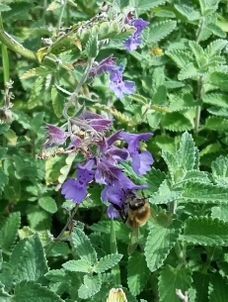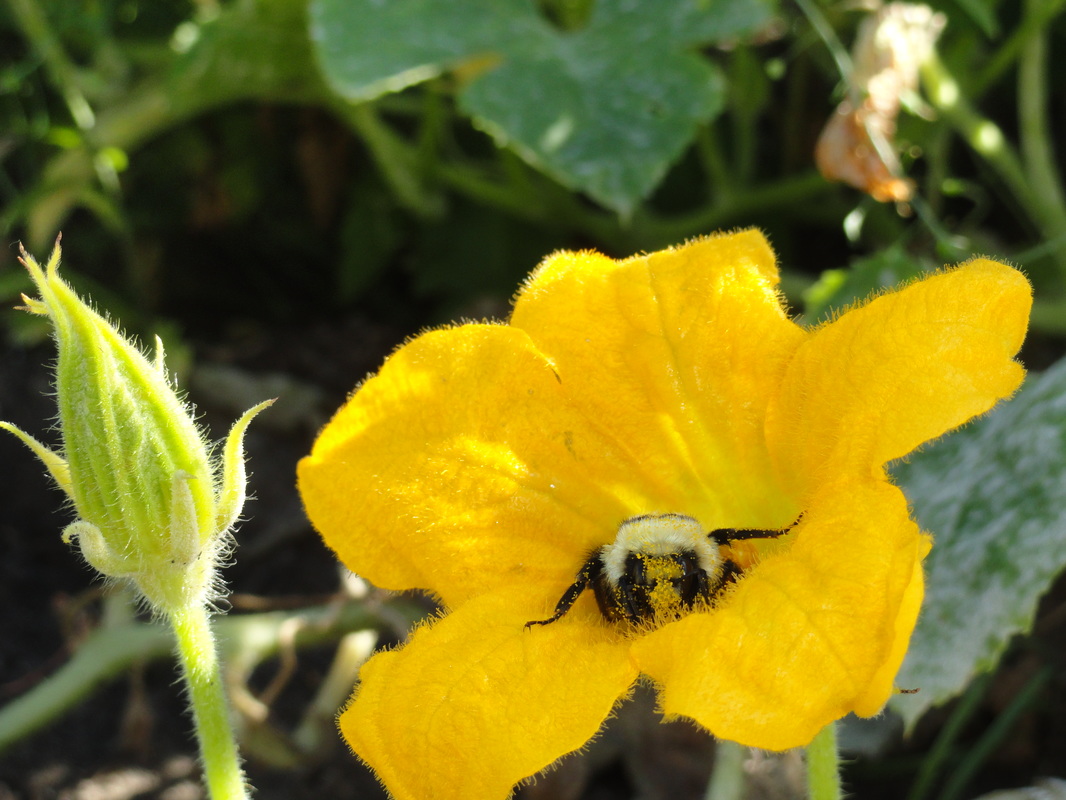
Mid summer when all of the plants bloom and grow, there is always pollen for them to collect, budding shrubs, wild flowers, and even trees that offer up a smorgasbord of pollen. Then fall hits, the variety of budding plants dwindle and the beautiful bees, in this urban environment, are left to hunt out what is left.
Over the years I have learned how essential they are to our food crops, not just bees but all pollinators like wasps, butterflies, flies, moths, and flower beetles. They are essential to crops like kiwis, melons, cashews, macadamia, apples, passion fruit, pears, and berries, and helpful to hundreds of other fruits and veggies. For an extensive list you can find here.
Everyone seems to love the honey bee, so close to our sweet seaking hearts! I personally champion the Bumble, the Bumble that has no sweet nectar to offer up to mankind, only the low drum of wings and their curiosity in us that seems so full of character and the cross pollination of plants that makes variety and species stronger.
In My little urban garden I experiment with what draws them all, and I've come up with a short list of late bloomers that seem help with that last push before they tuck themselves in their hives or their holes for a winter's rest.
Squash: I find blooms through mid and late summer all the way into fall, The bumbles especially like the big pollen that is produced and I will often times see them napping in the flower, and I always get a bumper harvest.
Sunflowers: also have a long bloom period and even as they dry out latter in the season I see all types of bees and bugs on the beautiful seed pad.
Basil: It’s hard to let basil go to flower, because the leaves become spicy and bitter, but if you do, the bees will come in droves. I will try and leave a few plants to their wild ways, and it seems that all species love them!
Lavender: is another great, late season bloom last, this comes from a hearty heirloom species, as I find that many new hybridized species, can't stand the cold into the fall here in Western Canada.
Salvia or Sage: a beautiful bloom, it is also known for it healing properties. The German Commission E approved internal use for mild gastrointestinal upset and excessive sweating as well as for external use in conditions of inflamed mucous membranes of the mouth and throat.Sage has been used effectively for throat infections, dental abscesses, infected gums and mouth ulcers. The phenolic acids in sage are particularly potent against Staphylococcus aureus. In vitro, sage oil has been shown to be effective against both Escherichia coli and Salmonella species, and against filamentous fungi and yeasts such as Candida albicans. Sage also has an astringent action due to its relatively high tannin content and can be used in the treatment of infantile diarrhoea. Its has an antiseptic action in intestinal infection.
Love it , plant it, and let it be a benefit to everyone!
Catmint: as a lovely aromatic smell when pinched off and is still shooting new blooms in Sept. This can be picked and dried to use as tea. Just leave the blooming stems for our friends!
Thyme: is also a great blooming groundcover, I find in my garden, the wooly time is on a sunny slope and will bloom into the fall. I find the bees, especially the bumbles will walk or hop from bloom to bloom, so fascinating to watch.
Another amazing thing to watch is "The secret life of the Bumble Bee", on curiosity stream, awesome!
So I've had clients and friends ask why I talk about the bees and "growing something", anything, so much in my work. I do because it is not just about what nourishes our bodies, we need to nourishing our environment, it takes care of us, and we should try our best to take care of it. Growing something, especially food and herbs, will nourish your soul whether its a small container on the kitchen table or turning up the grass to grow greens.
There is a beautiful saying and I can not seem to find the author or reference for where I saw it but it stuck.
So I will leave you with this;
"We have two houses while we are here, the first is our body, the second our planet, there is no other so keep them well."
